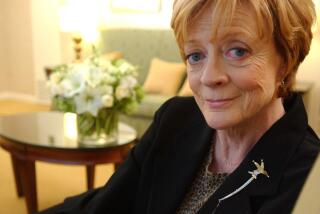‘Downton Abbey’s’ intrigue continues
- Share via
The many-chambered, highly peopled country house known as “Downton Abbey” opens again Sunday for visitors — that’s you, I’m being metaphorical — returning for a second season under the umbrella of PBS series “Masterpiece Classic.” It is classic not for being based on some famous old book — it is an original work for television, created by Julian Fellowes (“Gosford Park”) — but because it is a period piece set in a world we associate with famous old books and, in a secondary way, with “Masterpiece Theater” itself, home of the similar, chronologically overlapping “Upstairs, Downstairs” and the primary domestic expression of the Anglo-American “special relationship,” television branch, since 1971.
The series, whose first season won Emmys for writing, directing, costumes, cinematography, outstanding miniseries and supporting actress Maggie Smith, who plays the Dowager Countess of Grantham, is something of a phenomenon, a smart, seductive soap opera wrapped in Valentine ribbons. It is big, beautiful, beautifully acted and romantic, its passions expressed with that particular British reserve that serves only to make them burn brighter. It even has its own fan fiction.
If you have not been watching, much of what follows may make no sense, but the gist of it is that because Robert and Cora Crawley, the Earl and Countess of Grantham (Hugh Bonneville and Elizabeth McGovern) have no son, only three somewhat difficult daughters, their estate will eventually be inherited by Robert’s distant, suspiciously viewed cousin, Matthew Crawley (Dan Stevens). The first season, which began with the sinking of the Titanic and ended with a declaration of war, resolved little.
Matthew, finally embraced as family, ceased his pursuit of the deep troubled pool that is Lady Mary (Michelle Dockery) and left Downton. The series’ scowling villains, such as they are — an ambitious footman (Rob James-Collier), a territorial ladies’ maid (Siobhan Finneran) — were denied their victories, but (promising flickers of inner light notwithstanding) continue to trouble the waters.
“Sometimes it feels as if all the men I ever danced with are dead,” says Lady Sybil (Jessica Brown-Findlay), the youngest and best of the Crawley girls. It is now November 1916 — the passage of time marked by the women’s looser clothing and shorter hair — and the Great War is two years old. Matthew is in the thick of it; the Earl, who has gotten his uniform out of mothballs, would like to be. Sybil, the political sister, is looking to help the returning wounded. Lady Edith (Laura Carmichael) is learning to drive. (“You are a lady,” protests the Dowager Countess, “not Toad of Toad Hall.”) And Mary is attempting, coldly, to settle her life.
Although Fellowes is gentle with his characters — and especially with the gentry — there is a tension that maintains, because we know how drama works; at one time or another, most will wear a target. But he tends to avoid the easy shot.
The show, which shifts shape between comedy and drama, is less about the sensational moment than about the texture of the relationships. It hangs on its love stories: Matthew and Mary (complicated now by new involvements for each), valet Bates (Brendan Coyle) and head housemaid Anna (Joanne Froggatt), still fighting their way out of the shadow of his past; Sybil’s more than friendly friendship with socialist chauffeur Branson (Allen Leech); and the ripened relationship of the Earl and the Countess, who unfashionably share a bedroom.
Although the series is set at a time of change, the appeal to contemporary viewers is nevertheless that of an earlier, more regulated time, when people knew where they stood, and where they sat and which silverware to use — or to set out to be used. (American audiences may harbor an additional, transatlantic regard for England as a paradise from which we have, through our own devices, fallen away.) Fellowes makes sure to remind us from time to time that this system was deeply flawed. Yet the weight of “Downton Abbey” is behind that order; it pushes us to root for its survival, and for the health of the organism that is Downton, upstairs and down.
That’s the whole point of the story, from the very beginning: that no matter in whose hands it is left, or who leaves it, Downton Abbey will survive. Viewers setting out on this second season may be heartened to know in advance that a third series has already been commissioned.
More to Read
The biggest entertainment stories
Get our big stories about Hollywood, film, television, music, arts, culture and more right in your inbox as soon as they publish.
You may occasionally receive promotional content from the Los Angeles Times.











